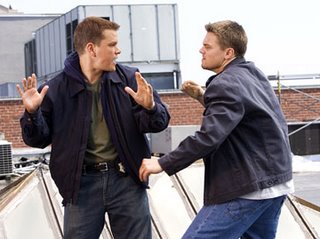The Departed

The Departed heralds Martin Scorsese’s return to the top of his game and simultaneously secures for the film a place in the pantheon of the very best of American crime cinema.
Welcome back to Scorsese’s mean streets.
Martin Scorsese has taken the Hong Kong action classic, Infernal Affairs, borrowed its very deserving skeleton, and re-packed it with the distinctly American sensibilities of gangsters, corruption and betrayal in Irish Boston. Forget what you’ve ever felt about the inadequacies of re-makes–The Departed is a towering, ambitious achievement.
The cops have wanted to take down crime boss, Frank Costello (Jack Nicholson) for years. But they can never get close enough to him to gather the sort of evidence that would make a conviction stick. When Billy Costigan, a young man from the wrong side of the tracks joins the force, the opportunity is seen to infiltrate Costello’s organization. Unknown to the police, however, Costello has his own spy in their ranks in the form of poster-boy cop Colin Sullivan (Matt Damon). Initially ignorant of each others’ roles, the two “rats” burrow their way into their perspective worlds until it becomes all too clear that for either of them to come out alive, they must find and destroy the other. The men risk schizophrenic breaks, dividing their loyalties and their own personalities. The deeper they go and the longer they’re in, the more difficult the ability to extract their true identities from their fake personas.
Scorsese runs their stories parallel to each other from the opening scene (complete with surrogate father figures and a dicey love triangle), and develops their characters so completely that viewers will legitimately find themselves won over by the charm and warmth of Sullivan and turned off by the anti-social behavior of Costigan. Anti-heroes and flawed protagonists are hardly new to cinema, but they have rarely been so convincingly drawn as to make viewers rout for the bad guy and loath the good guy.
Within this thicket of paranoia, two of the most superb actors of our generation meet in a tension-laden game of cat and mouse. Damon is cocky and charming, monstrosity coiled beneath a veneer of utter respectability. DiCaprio is exactly the opposite. He is a man adrift on a sea of grief, addiction and uncontrollable wrath. But his soul is good, and we watch upon his face what Scorsese has called the “battleground of moral conflicts.” DiCaprio, who has always–yes, always–been an actor of staggering ability, shows his acting has finally caught up with his emotional gravity. His third film with the director, DiCaprio no longer needs to prove to anyone why he is Scorsese’s new Robert DeNiro.
The supporting actors are no less steller. Nicholson chews up and spits out every frame. Alec Baldwin, as Damon’s boss, is inspired comic relief. Martin Sheen, as DiCaprio’s boss, brings vulnerability and tenderness. Newcomer Vera Farmiga, as the woman caught between the two men, is angelic. And Mark Wahlberg steals absolutely every scene he’s in as the foul-mouthed, lava for blood, police sergeant who ultimately gets the last laugh.
The Departed is not for the faint of heart. This is Scorsese working with his complete bags of tricks–subtlety and nuance as well as some of the most brazen and audacious violence you’ve ever seen. That he knows what to use when, and even knows when the two can be injected into the same time and space, shows why he is a master craftsman of the medium. The Departed is also something else, rather unexpected. It is very funny. That this comedy comes hand in hand with some of the most graphic bloodletting on the screen this or any year makes its triumph all the more extraordinary. That a movie this incessantly violent, this brutal should be this much fun is almost beyond explanation.
William Monahan’s script is something electric. The film is two and half hours lean, crackling with an edginess, wit, and primal tension that act as engines to propel scenes roaring through the film like locomotives that have jumped the track and now careen dangerously out of control. The entire movie, and even Scorsese’s kinetic camerawork that rarely sits still, is a aria of explosive motion. Before the final credits role, the words operatic and Shakespearian will inevitably come to mind.
Scorsese has always been one of the undisputed masters of the crime drama (Michael Mann’s presence in the genre negates the freedom to regard him as the undisputed master), though The Departed is the kind of film he has not visited since Goodfellas. What makes The Departed a masterpiece–and it is a masterpiece–is the fact that it is also the finest film he has made since Goodfellas. After a series of gorgeous but mediocre projects, and a few good old fashioned duds, Scorsese has made a brilliant powerhouse of cinema and a downright ferociously entertaining film.
The Departed is euphorically confident and assured, made by a director who understands cinema in both its technical and its artistic veins. Scorsese includes the sort of cinematic winks this review will not give away, but rest assured, work like gangbusters. From any other director they would be lampooned, but from Scorsese, we applaud his bravado and virtuosity. The result is a film that works on every conceivable level. It is for films like this–exciting, invigorating, wicked, bloody, convoluted, hilarious, and unapologetic–that we go to the movie house in the first place.


2 Comments:
I. Cannot. Wait.
You wrote:
That this comedy comes hand in hand with some of the most graphic bloodletting on the screen this or any year makes its triumph all the more extraordinary. That a movie this incessantly violent, this brutal should be this much fun is almost beyond explanation.
So, the old Master Scorsese is learning from the young Pup Tarantino.
I'd never seen anything like this before Pulp Fiction. Interesting...
Post a Comment
<< Home